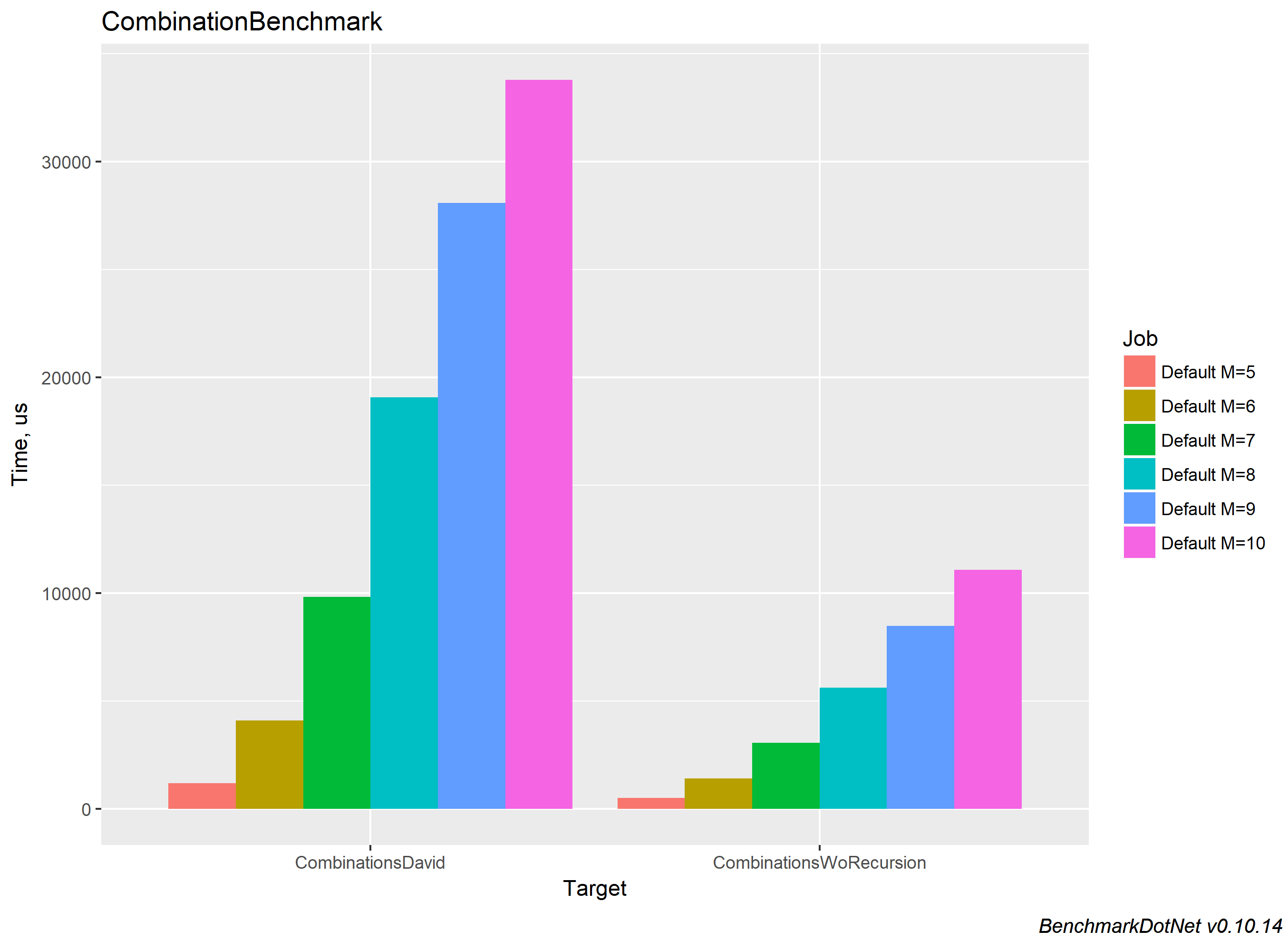Was asked this today in an interview. Didn't see it before, and spent quite a lot of time getting it to work (tricky with all the recursion).
The goal was to find all possible combinations of choosing k elements from a n-sized array (basically the Binomial coefficient) and return them.
Unlike this code - here I don't want all possible combinations, just those that are k in size. Permutations inside a k-size element are not counted (i.e. (1,2,3) == (2,1,3) == etc.).
The code assumes all elements in the array are unique (I guess it can be added to the basic sanity tests in the beginning, or handled in a way ).
The algorithm uses recursion, and some counter array (pushForward) to keep track of the permutations.
It works (At least in my tests).
Would be happy to hear if this can be simplified or made more efficient :-)
public class Combinations
{
private int[] _array; // holds the initial array; Assumed to contain different elements!!!
private int _k; // the k elements needed to be chosen from that array
private int[] _pushForward; // a kind of a counter to keep track how much we need to move forward each column
private List<int[]> _results; // the results (all combinations);
private int[] _element; // the working element that is changed all the time
public List<int[]> GetAllCombinations(int[] array, int k)
{
int len = array.Length;
// basic sanity check
if (len < k)
throw new ArgumentException("Array length can't be less than number of selected elements");
if (k < 1)
throw new ArgumentException("Number of selected elements can't be less than 1");
_array = array;
_k = k;
_results = new List<int[]>();
_element = new int[k];
_pushForward = new int[k]; // they are initialized to Zero already, no need to initialize again
// the first element can move up to this position (in permutations); subsequent elements could move +1
int maxStepsForward = len - _k + 1;
// entrance to recurssion method
GetCombinations(0, maxStepsForward);
return _results;
}
// col - the initial column handled in this recurse; can be between 0..k-1
// maxSteps - correction for the max index; max index that this for loop can reach
private void GetCombinations(int col, int maxSteps)
{
for (int j = col + _pushForward[col]; j < maxSteps; j++)
{
// enter the corresponding column element
_element[col] = _array[j];
// if not in the last column enter recursion and move to next column
if (col < _k - 1)
GetCombinations(col + 1, maxSteps + 1);
// else, just add the element
else if (col == _k - 1)
{
// element is copied to new place in memory (shallow copy - works on ints) as working copy is constantly changed
int[] insert = new int[_k];
_element.CopyTo(insert, 0);
// new element is added to result list
_results.Add(insert);
}
}
// if we're out of the for loop, it means we finished a last-column cycle and need to push forward
// pushing forward is done for all elements in subsequent columns
if (col > 0)
{
_pushForward[col - 1]++;
for(int k = col; k < _k; k ++)
_pushForward[k] = _pushForward[col - 1];
}
}
}
EDIT:
I have another way using bit operations, that is a bit less efficient I think, but maybe simpler... It uses a bitwise operation hack to check if the number of bits are equal to k elements (This can also be done less efficiently without the hack by converting the int to binary and then counting the 1's).
public List<int[]> GetAllCombinationsUsingBits(int[] array, int k)
{
var result = new List<int[]>();
var len = array.Length;
var total = Math.Pow(2, len);
for (int i = 1; i < total; i++)
{
// could also be checked by counting the ones in the binary, though this will require moving the binary up
if (numberOfSetBits(i) == k)
{
var element = new int[k];
var binary = Convert.ToString(i, 2);
var bLen = binary.Length;
if ( bLen < len)
binary = PrependZero(binary, len - bLen);
int counter = 0;
for (int j = 0; j < len; j++)
{
if (binary[j] == '1')
{
element[counter] = array[j];
counter++;
}
}
result.Add(element);
}
}
return result;
}
private string PrependZero(string binary, int i)
{
for (int j = 0; j < i; j++)
binary = "0" + binary;
return binary;
}
private int numberOfSetBits(int i)
{
i = i - ((i >> 1) & 0x55555555);
i = (i & 0x33333333) + ((i >> 2) & 0x33333333);
return (((i + (i >> 4)) & 0x0F0F0F0F) * 0x01010101) >> 24;
}

